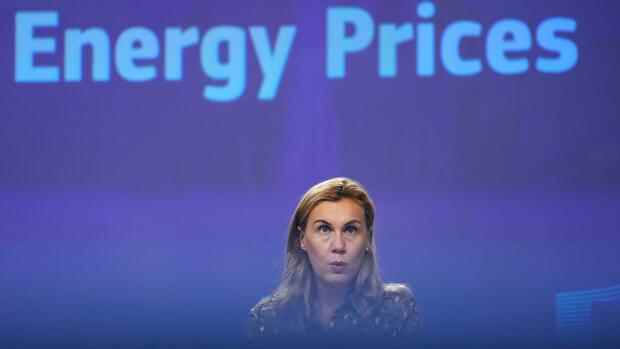“The Commission is helping Member States take immediate action to mitigate the consequences for citizens and businesses this winter.”
(Photo: AP)
Brussels, Berlin In the opinion of the EU Commission, European households and companies should be protected from the rapidly rising energy prices as quickly as possible. Energy Commissioner Kadri Simson presented a so-called “toolbox” with tools that EU countries can use without violating European competition rules.
Among other things, the Commission proposes direct payments, tax breaks and subsidies for small businesses. But it is also considering medium-term reforms to make the European energy market more robust in the long term.
“It is important to support vulnerable citizens and European businesses as we come out of the pandemic and start the recovery,” Simson said. “The Commission is helping Member States take immediate action to mitigate the consequences for citizens and businesses this winter.”
The “Toolbox” also contains possible measures against future price fluctuations. The Brussels authority wants to take a closer look at a proposal for joint gas purchases and gas reserves. One will investigate whether such a procedure would bring advantages to the countries, explained Simson.
Top jobs of the day
Find the best jobs now and
be notified by email.
The construction of the European energy market is also to be examined carefully. “The current situation is extraordinary, but the internal energy market has benefited us for 20 years,” said the Energy Commissioner. The medium-term measures of the “Toolbox” are to be discussed at an EU summit at the end of next week.
Previous measures all in line with EU law
The reactions of the states to the high prices so far are in line with EU law, added Simson. 20 countries have responded, among other things, with tax cuts or aid for the poor.
In Germany, the high energy prices meet the talks on the formation of a government and the efforts to achieve the climate protection goals. Among other things, the price on CO2 emissions makes fossil fuels more expensive.
The reasons for the high prices are, on the one hand, the economic recovery of the states after the Corona crisis. The past, comparatively harsh winter also contributed, as the gas storage tanks are not as full as usual.
There are also voices who hold Russia jointly responsible because it hardly supplies any additional natural gas. Among the Greens in Germany, for example, this feeds the suspicion that the country is trying to put pressure on the Nordstream 2 gas pipeline to go into operation quickly.
Fuel prices on record course too
On Wednesday the Russian government announced again that it would deliver the maximum according to the existing contracts. More is only possible after negotiating new agreements.
Not only in gas prices, but also at the petrol station, consumers are currently feeling the massive price increase: fuel prices keep on rising. In the meantime, Diesel and Super E10 have reached nine-year highs, as the ADAC announced on Wednesday. Only in the record year 2012 was fuel a few cents more expensive, but the gaps are shrinking noticeably.
Diesel in particular increased: On Tuesday, according to ADAC, fuel cost 1.526 euros per liter on a national daily average – 4.8 cents more than a week ago. This means that diesel is still 2.8 cents short of the all-time high from August 2012. E10 also became significantly more expensive. On Tuesday it was 1.647 euros per liter, 3.8 cents more expensive than a week ago. This means that 6.2 cents are missing from the all-time high from September 2012.
The federal government is not planning any additional measures
The incumbent federal government is not planning any additional government measures to counter rising energy prices. Government spokesman Steffen Seibert said on Wednesday in Berlin that he could not announce such measures that would affect the next government.
The federal government is continuously following the price development. Relief has already been decided: a reduction in the EEG surcharge to promote green electricity from state funds, an increase in the commuter allowance and improvements in housing benefits.
A spokeswoman for the Federal Ministry of Economics said the security of supply in Germany was still high. The demand is fully met in the market. The ministry currently sees no supply bottlenecks in the gas supply in Germany.
The gas storage facilities in Germany are currently 75 percent full, and there has been an increase in the past few weeks. There was a similar level in 2015/2016, when the country got through the winter well. The gas storage facilities have been filled to a greater extent in recent years.
There is no government target, this is a matter for the market. This has already reacted to the global increase in demand for gas. Norway has increased its funding volume.
The spokeswoman for Economics Minister Peter Altmaier (CDU) said it was important to expand the internal energy market and renewable energies in the medium term. This reduces energy imports and has a price-dampening effect. She also referred to Altmaier’s demand to abolish the billions in the EEG surcharge and to keep low-income households in view in view of the increased energy prices.
More: Gas price shock for the global economy – “Energy crisis is becoming a question of survival for many companies”


